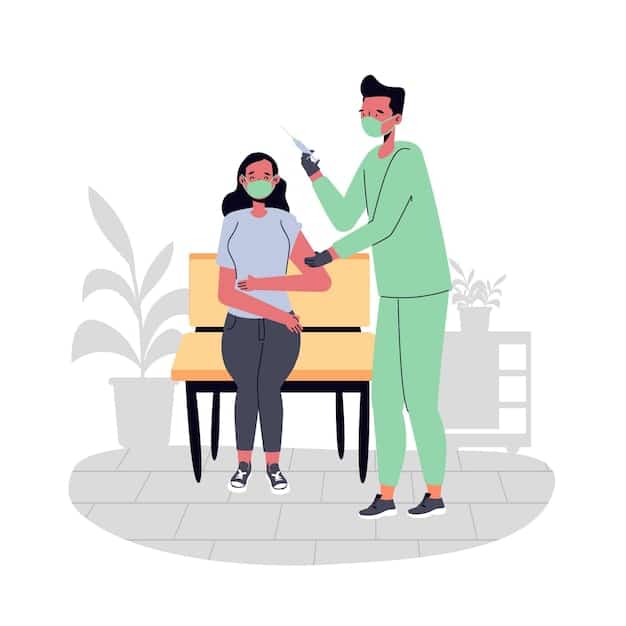Preventative Care: How Free Screenings Save Thousands

Preventative care, including free screenings, can save thousands in the long run by detecting health issues early, leading to more effective and less costly treatments.
Discover how preventative care: how free screenings can save you thousands in the long run by catching health problems early, reducing the need for expensive treatments later.
Understanding Preventative Care
Preventative care is all about taking steps to maintain your health and prevent diseases before they start. Regular check-ups and screenings are key to identifying potential health issues early on.
What is Preventative Care?
Preventative care includes routine medical exams, screenings, and vaccinations that help you stay healthy. It’s about being proactive rather than reactive when it comes to your health.
These measures aim to identify risk factors and early signs of illness, allowing for timely intervention and management. This can drastically improve health outcomes and reduce healthcare costs.
Why is Preventative Care Important?
Early detection of diseases through preventative care can significantly improve treatment outcomes. It also helps in managing chronic conditions more effectively.
- Early Detection: Catches health problems before they become serious.
- Cost Savings: Reduces the need for expensive treatments later.
- Improved Health: Helps maintain overall well-being.
- Better Quality of Life: Ensures a healthier and more active life.
By focusing on prevention, individuals can avoid many of the complications and expenses associated with advanced stages of disease.
In conclusion, preventative care is an investment in your health, offering numerous benefits that extend far beyond just physical well-being.
The Financial Benefits of Free Screenings
Free screenings offer a way to access crucial health services without the burden of cost. They can help detect conditions like high blood pressure, diabetes, and certain cancers early, which can save you money in the long run.

How Free Screenings Save Money
Screenings like mammograms, colonoscopies, and blood pressure checks can identify health problems early, often before symptoms appear. Early detection can lead to less invasive and more affordable treatments.
For example, detecting breast cancer early through a mammogram can allow for less aggressive treatment options, such as lumpectomy instead of mastectomy.
Real-Life Cost Savings
Consider the cost of treating advanced-stage cancer compared to early-stage cancer. The difference can be tens of thousands of dollars. Free screenings can also reduce the need for emergency room visits and hospitalizations.
- Reduced Treatment Costs: Early detection often means less intensive and expensive treatments.
- Fewer Hospitalizations: Preventative care can keep chronic conditions in check, reducing hospital visits.
- Improved Productivity: Healthier individuals are more productive at work, contributing to financial stability.
- Lower Medication Costs: Managing conditions early can sometimes reduce the need for long-term medication.
Ultimately, investing in preventative care through free screenings is a financially smart decision that yields significant returns in terms of both health and wealth.
In summary, free screenings provide a valuable opportunity to proactively manage your health and avoid significant financial burdens down the line.
Types of Free Screenings Available in the US
In the US, various organizations and healthcare providers offer free screenings for different health conditions. Knowing what’s available can help you take advantage of these resources.
Common Free Screenings
Some of the most common free screenings include blood pressure checks, cholesterol screenings, diabetes screenings, and cancer screenings (such as mammograms and pap smears for women). Community health centers and local health departments often provide these services.
Many pharmacies also offer free blood pressure screenings, making it easy for individuals to monitor their heart health regularly.
Where to Find Free Screenings
Free screenings are often available at community health fairs, local hospitals, and health clinics. The Affordable Care Act has also made preventative services more accessible by requiring insurance plans to cover certain screenings without cost-sharing.
- Community Health Centers: Offer a range of free or low-cost services.
- Local Health Departments: Provide screenings for various health conditions.
- Pharmacies: Often offer free blood pressure and cholesterol screenings.
- Health Fairs: Host events with multiple free health screenings.
By utilizing these resources, individuals can stay informed about their health status and take proactive steps toward maintaining their well-being.
To conclude, understanding the types of free screenings available and where to find them is crucial for taking charge of your health and financial well-being.

The Role of Insurance in Preventative Care
Understanding how your health insurance covers preventative care is essential. The Affordable Care Act (ACA) has expanded access to many preventative services, but it’s important to know the specifics of your plan.
ACA and Preventative Services
The ACA requires most health insurance plans to cover a range of preventative services without charging a copayment, coinsurance, or deductible. These services include vaccinations, screenings, and wellness visits.
This provision ensures that individuals can access essential preventative care without facing financial barriers, promoting better health outcomes and reducing healthcare costs.
Navigating Your Insurance Plan
To make the most of your insurance plan, review the list of preventative services covered at no cost. Contact your insurance provider if you have any questions about coverage.
- Review Your Policy: Understand what services are covered without cost-sharing.
- Contact Your Insurer: Clarify any questions about coverage or eligibility.
- Utilize In-Network Providers: Ensure you’re seeing providers within your insurance network to avoid unexpected costs.
- Keep Records: Maintain a record of your preventative care visits and screenings.
Knowing your rights and understanding your insurance coverage can empower you to take full advantage of preventative care services.
In essence, understanding your insurance coverage is key to accessing preventative services and maximizing the benefits of the ACA.
Lifestyle Changes That Complement Preventative Care
While screenings and check-ups are important, lifestyle changes play a significant role in preventative care. Adopting healthy habits can significantly reduce your risk of developing chronic diseases.
Healthy Habits for Prevention
Regular exercise, a balanced diet, adequate sleep, and stress management are vital components of a healthy lifestyle. These habits can help prevent conditions like heart disease, diabetes, and obesity.
For example, incorporating regular physical activity into your routine can improve cardiovascular health and reduce the risk of type 2 diabetes.
Making Sustainable Changes
Start by making small, achievable changes. Gradually incorporate more fruits and vegetables into your diet, aim for at least 30 minutes of exercise most days of the week, and prioritize sleep and stress reduction techniques.
- Balanced Diet: Focus on fruits, vegetables, lean proteins, and whole grains.
- Regular Exercise: Aim for at least 150 minutes of moderate-intensity exercise per week.
- Adequate Sleep: Prioritize 7-8 hours of quality sleep each night.
- Stress Management: Practice relaxation techniques like meditation or yoga.
Consistency is key. Over time, these small changes can have a profound impact on your overall health and well-being.
In short, combining preventative screenings with healthy lifestyle choices is a powerful way to maintain your health and reduce your risk of developing chronic diseases.
Overcoming Barriers to Accessing Preventative Care
Despite the availability of free screenings and insurance coverage, many individuals face barriers to accessing preventative care. Addressing these barriers is crucial for improving health outcomes.
Common Barriers to Care
Some common barriers include lack of awareness, transportation issues, language barriers, and mistrust of the healthcare system. Overcoming these barriers requires targeted outreach and culturally sensitive approaches.
For example, providing information in multiple languages and offering transportation assistance can help overcome some of these barriers.
Solutions and Resources
Community organizations and healthcare providers can play a significant role in addressing these barriers. Offering educational programs, mobile screening units, and assistance with navigating the healthcare system are effective strategies.
- Educational Programs: Increase awareness about the importance of preventative care.
- Mobile Screening Units: Bring screenings to underserved communities.
- Language Assistance: Provide interpretation services for non-English speakers.
- Transportation Assistance: Offer rides to and from appointments.
By addressing these barriers, we can ensure that everyone has access to the preventative care they need to stay healthy.
To summarize, overcoming barriers to accessing preventative care is essential for promoting health equity and improving overall health outcomes.
| Key Point | Brief Description |
|---|---|
| 🩺 Early Detection | Detecting diseases early leads to less invasive and costly treatments. |
| 💰 Cost Savings | Free screenings prevent expensive hospitalizations and treatments in the future. |
| ❤️ Healthier Lifestyle | Combining screenings with healthy habits enhances overall well-being. |
| 🤝 Access to Care | Overcoming barriers ensures everyone benefits from preventative services. |
Frequently Asked Questions
▼
Preventative care includes routine check-ups, screenings, vaccinations, and counseling to prevent diseases before they start. These services help maintain and improve your overall health.
▼
You can find free health screenings through community health centers, local health departments, health fairs, and some pharmacies. Check online directories and local listings for events.
▼
Yes, most health insurance plans, especially those compliant with the Affordable Care Act (ACA), cover a range of preventative services without cost-sharing, such as copays or deductibles.
▼
Adopting a balanced diet, engaging in regular exercise, getting adequate sleep, and managing stress can significantly enhance preventative care outcomes and reduce the risk of chronic diseases.
▼
Preventative care is crucial because it promotes health equity, improves overall health outcomes, and helps individuals avoid costly and invasive treatments by detecting and managing conditions early.
Conclusion
Investing in preventative care: how free screenings can save you thousands in the long run is a smart choice for your health and your wallet. By taking advantage of free screenings and adopting healthy lifestyle habits, you can stay healthy, avoid expensive medical treatments, and enjoy a better quality of life.





